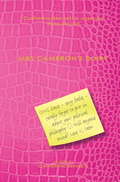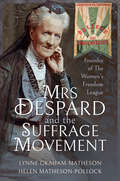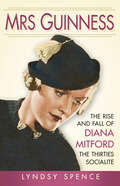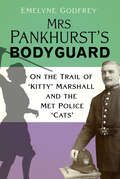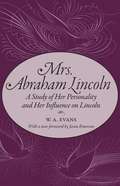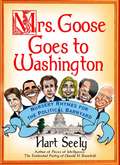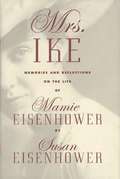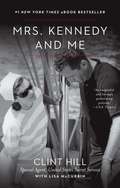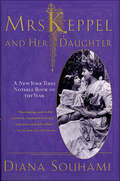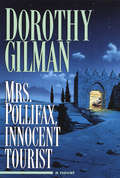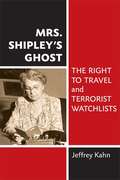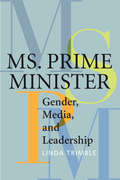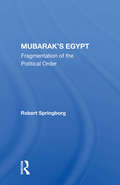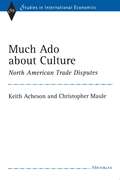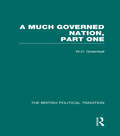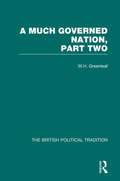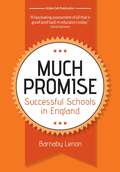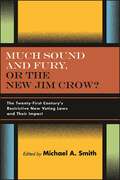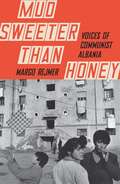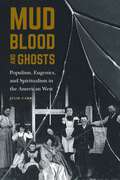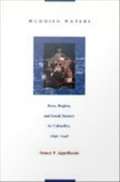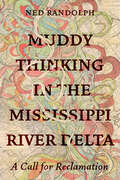- Table View
- List View
Mrs Cameron's Diary
by Catherine BennettDave's mobile went - poor Cleggsy, wanting to know what the Queen was like. "Incredibly nervous," Dave said. "But Sam soon put her at her ease."'We have heard, it seems, every opinion on the rise of the coalition save one: that of the new Prime Minister's wife, Samantha. Star journalist Catherine Bennett has stepped in to give us a glimpse of Sam Cam's first year in Downing Street. What to do about Cherie's nightmare granite'n'pine kitchen? How can Dave's rationingy-austerity-depressiony vibe be harnessed for the luxury goods market? Is there a polite strategy for avoiding Miriam Clegg's bookclub?
Mrs Despard and the Suffrage Movement: Founder of The Women's Freedom League (Trailblazing Women Ser.)
by Lynne Graham-Matheson Helen Matheson-PollockThe biography of an activist who dedicated her long life to standing up for women, children, and the poor.Charlotte Despard, social reformer and suffragette, was always known as Mrs Despard, never Charlotte. Her name should be as familiar to historians as those of Emmeline Pankhurst and Millicent Fawcett—yet she remains overlooked.Born in 1844, she found solace in literature during a difficult childhood, identifying with Milton’s Satan and the romantic words of Shelley. She married Maximillian Despard and had the opportunity to explore the world and try her hand at a career as a novelist. When she was widowed in her early forties, her money and status allowed her to live a life of surprising freedom for a woman of her time. She used it to improve the lot of the poor—and moved to live among them in the London slums. She fought for better living and working conditions for all, supporting adult suffrage before becoming involved in the fight for votes for women. She joined Emmeline Pankhurst’s Women’s Social and Political Union and, when that organization split in 1907, co-founded the Women’s Freedom League, becoming its first, and much loved, president. She also served as editor of its newspaper, The Vote. When suffrage activities were largely suspended after the outbreak of WW1 in 1914, she returned to her Irish roots and moved to Dublin to support the fight for Irish home rule. After some women were enfranchised in 1918, she even tried running for Parliament. And though she died penniless at ninety-five—having given all her money to helping those less fortunate—her quiet legacy is felt to this day in causes supporting the rights of women and children.
Mrs Despard and the Suffrage Movement: Founder of The Women's Freedom League (Trailblazing Women Ser.)
by Lynne Graham-Matheson Helen Matheson-PollockThe biography of an activist who dedicated her long life to standing up for women, children, and the poor.Charlotte Despard, social reformer and suffragette, was always known as Mrs Despard, never Charlotte. Her name should be as familiar to historians as those of Emmeline Pankhurst and Millicent Fawcett—yet she remains overlooked.Born in 1844, she found solace in literature during a difficult childhood, identifying with Milton’s Satan and the romantic words of Shelley. She married Maximillian Despard and had the opportunity to explore the world and try her hand at a career as a novelist. When she was widowed in her early forties, her money and status allowed her to live a life of surprising freedom for a woman of her time. She used it to improve the lot of the poor—and moved to live among them in the London slums. She fought for better living and working conditions for all, supporting adult suffrage before becoming involved in the fight for votes for women. She joined Emmeline Pankhurst’s Women’s Social and Political Union and, when that organization split in 1907, co-founded the Women’s Freedom League, becoming its first, and much loved, president. She also served as editor of its newspaper, The Vote. When suffrage activities were largely suspended after the outbreak of WW1 in 1914, she returned to her Irish roots and moved to Dublin to support the fight for Irish home rule. After some women were enfranchised in 1918, she even tried running for Parliament. And though she died penniless at ninety-five—having given all her money to helping those less fortunate—her quiet legacy is felt to this day in causes supporting the rights of women and children.
Mrs Guinness: The Rise and Fall of Diana Mitford, the Thirties Socialite
by Lyndsy SpenceBefore Diana Mitford's disgrace as a social pariah, she was a celebrated member of the Bright Young Things, moving at the centre of 1920s and '30s London high society. She was a muse to many: Helleu painted her, James Lees-Milne worshipped her, Evelyn Waugh dedicated a book to her and Winston Churchill nicknamed her 'Dina-mite'. As the young wife of Bryan Guinness, heir to the Guinness brewing empire, she lived a gilded life until fascist leader Sir Oswald Mosley turned her head. Unpublished letters, diaries and archives bring an unknown Diana to life, creating a portrait of a beautiful woman whose charm and personality enthralled all who met her, but the discourse of her life would ultimately act as a cautionary tale. This groundbreaking biography reveals the woman behind the myth.
Mrs Pankhurst's Bodyguard: On the Trail of ‘Kitty’ Marshall and the Met Police ‘Cats’
by Emelyne Godfrey‘Beautifully told, this book brings a fascinating and compelling story to a wider public. A “must read” for those interested in women’s lives in the past.’ June Purvis, Professor (Emerita) of Women’s and Gender History, University of Portsmouth, UK‘This important and absorbing book presents a unique history of Kitty Marshall. This is first-class history and a first-rate thriller.’ Professor Clive Bloom, author of A History of Britain’s Fight for a RepublicKatherine ‘Kitty’ Marshall was destined to break with convention. Brought up in a socially active family, her inherent rebellious streak came into play in 1901, when she daringly divorced her husband and joined the newly founded Women’s Social and Political Union (WSPU), campaigning for women’s suffrage.In 1904, she married solicitor Arthur Willoughby Marshall and the couple soon became a powerhouse team in the movement: Arthur defending the suffragettes in court while Kitty, trained in jujitsu and a member of the WSPU’s elite team ‘the Bodyguard’, helped her close friend Mrs Pankhurst evade the clutches of the authorities under the infamous Cat and Mouse Act. All the while, Kitty was under the watchful eye of the Metropolitan Police, and in particular Detective Inspector Ralph Kitchener, who frequently encountered the Marshalls in his work trailing the suffragette ‘mice’.Following events as they unfolded on both sides, Mrs Pankhurst’s Bodyguard is a gripping account of Kitty and Arthur’s incredible work and their fight for political equality.
Mrs. Abraham Lincoln: A Study of Her Personality and Her Influence on Lincoln
by W. A. EvansFirst published in 1932, this was the first thoroughly researched biography of Mary Lincoln ever written, and it remains the most balanced and complete work on this controversial First Lady. Author W. A. Evans challenges the disparaging views of Mary Lincoln that were generally accepted at the time, offering a comprehensive and informed look at a woman whose physical and mental health problems have often been misconstrued or overlooked by other biographers. Evans conducted extensive research, interviewing Mrs. Lincoln's family members, seeking advice and assistance from numerous Lincoln scholars and historians, scouring thousands of pages of contemporary newspapers and primary resources, reviewing correspondence Mary wrote during her stay at Bellevue Place sanitarium, and consulting with several medical experts. The result of all this research is an objective and detailed portrait of Mrs. Lincoln and her influence on her husband that still has a great deal of historical value for readers today. A new foreword by Jason Emerson, author of The Madness of Mary Lincoln, provides biographical information on Evans and background on the origins of the book and its reception and influence. Finally back in print, this classic biography is essential reading for all with an interest in the Lincoln family.
Mrs. Goose Goes to Washington
by Hart SeelyCan anything be poetic in the politicking of Washington, D. C. ? Is there poetry in the morning's headlines and in tonight's news tickers? Or, as Seely paraphrases Dr. Seuss, Do W's troubles trouble you, too? America's pundit poet laureate, the man who channeled the poetry of Donald Rumsfeld and Phil Rizzuto, now offers the perfect metaphor for the inside-the-beltway bubble: it's a nursery. Using the beneficent spirit of Mother Goose, he has fashioned hilarious nursery rhymes hidden amid the photo ops and filibustering. "John Kerry backed Iraq, John Kerry took it back," making him "a very airy, wary hara-kiri. " Bill Bennett, "independent, Kept a hidden secret muse. He would clutch his lucky pendant, Praying,'Papa needs new shoes!'"As for Iraq, "When you lose, you lose, and when you win, you win, and when you can't tell win from lose, best stop the war you're in. " No one is safe from Seely's wicked muse: Hillary Clinton, John McCain, Barack Obama, Mitt Romney, virtually every news anchor, and a good portion of the Hollywood elite are skewered unforgettably by Seely's Mother Goosequills in this irreverent and hilarious collection.
Mrs. Ike: Memories and Reflections on the Life of Mamie Eisenhower
by Susan EisenhowerSusan Eisenhower looks back on the life of her grandmother in a tribute that coincides with the centenary of Mamie Eisenhower's birth. In this compelling biography of an army captain's wife who becomes First Lady, she paints the portrait of an independent, headstrong woman who was passionately engaged in a lifelong relationship with a man who was her utter opposite. Although their fifty-three-year marriage was ultimately marked by public triumph and private contentedness, their lives together were not always easy. On army posts all over America, in Panama and the Philippines, in Paris and Washington, Mamie Eisenhower struggled to find her way in a military system that took dedication and self-sacrifice for granted--just as she worked to keep her marriage on an even keel after the death of their first child, during debilitating illnesses, and in the midst of painful isolation when her husband was absorbed by work or committed to the battlefield. Yet as her granddaughter knew well, she radiated optimism, though people rarely recognized the discipline and fortitude behind her cheerfulness and her apparently effortless courtesy.
Mrs. Kennedy and Me: An Intimate Memoir
by Clint Hill Lisa MccubbinThe #1 New York Times bestselling memoir by Clint Hill that Kirkus Reviews called “clear and honest prose free from salaciousness and gossip,” Jackie Kennedy’s personal Secret Service agent details his very close relationship with the First Lady during the four years leading up to and following President John F. Kennedy’s tragic assassination.In those four years, Hill was by Mrs. Kennedy’s side for some of the happiest moments as well as the darkest. He was there for the birth of John, Jr. on November 25, 1960, as well as for the birth and sudden death of Patrick Bouvier Kennedy on August 8, 1963. Three and a half months later, the unthinkable happened.Forty-seven years after the assassination of President John F. Kennedy, the one vivid image that never leaves Clint Hill’s mind is that of President Kennedy’s head lying on Mrs. Kennedy’s lap in the back seat of the limousine, his eyes fixed, blood splattered all over the back of the car, Mrs. Kennedy, and Hill as well. Sprawled on the trunk of the car as it sped away from Dealey Plaza, Hill clung to the sides of the car, his feet wedged in so his body was as high as possible. Clint Hill jumped on the car too late to save the president, but all he knew after that first shot was that if more shots were coming, the bullets had to hit him instead of the First Lady. Mrs. Kennedy’s strength, class, and dignity over those tragic four days in November 1963 held the country together.This is the story, told for the first time, of the man who perhaps held her together.
Mrs. Keppel and Her Daughter: A Biography
by Diana SouhamiAlice Keppel, the married lover of Queen Victoria's eldest son and great-grandmother to Camilla Parker-Bowles, was a key figure in Edwardian society. Hers was the acceptable face of adultery. Discretion was her hallmark. It was her art to be the king's mistress and yet to laud the Royal Family and the institution of marriage. Formidable and manipulative, her attentions to the king brought her wealth, power, and status. Her daughter Violet Trefusis had a long tempestuous affair with the author and aristocrat Vita Sackville-West, during which Vita left her husband and two sons to travel abroad with Violet. It was a liaison that threatened the fabric of Violet's social world, and her passion and recalcitrance in pursuit of it pitted her against her mother and society. From memoirs, diaries, and letters, Diana Souhami portrays this fascinating and intense mother/daughter relationship in Mrs. Keppel and Her Daughter. Her story of these women, their lovers, and their lovers' mothers, highlights Edwardian - and contemporary - duplicity and double standards and goes to the heart of questions about sexual freedoms.
Mrs. Pollifax, Innocent Tourist (Mrs. Pollifax #13)
by Dorothy GilmanPollifax fans rejoice! The courageous Connecticut matron whose prize-winning geraniums are second only to her dazzling defense maneuvers is back. Hailed an "enchantress" by The New York Times, Mrs. Pollifax is the CIA's most indispensable "bloodhound" and *as to be expected *she's hot on the track, stealthily sniffing out some major skullduggery.This time she's on loan to her retired CIA friend Farrell. Her bag lady act is the first phase of a mission to the Middle East: to smuggle out of Jordan the final manuscript of the dissident Iraqi novelist, Dib Assen, recently murdered in an Iraqi prison. Allegedly fiction, the script encodes the shocking truth of Saddam Hussein's reign.Allah willing, Farrell is to rendezvous near Amman with a man called Ibrahim, who will deliver the manuscript. All Mrs. P. has to do is look as much like a tourist as possible to deflect suspicion from her "cousin," Farrell.But hardly are the two airborne when the coils of Middle Eastern intrigue begin to unwind. Mrs. Pollifax's seatmate is not the affable Arab businessman he seems and the little carved plaque he secretly stashes in her carry-on bag is not a mere souvenir. It is not imagination that persuades Mrs. P. that wherever they go she and Farrell are followed, even to the old castle where Farrell is to meet the mysteriously elusive Ibrahim.To elude their pursuers in such a politically volatile country isn't easy. But Mrs. P. takes her challenges straight up *and this one may be our genteel heroine's stiffest yet. . . .
Mrs. Shipley's Ghost: The Right to Travel and Terrorist Watchlists
by Jeffrey KahnToday, when a single person can turn an airplane into a guided missile, no one objects to rigorous security before flying. But can the state simply declare some people too dangerous to travel, ever and anywhere? Does the Constitution protect a fundamental right to travel? Should the mode of travel (car, plane, or boat) or itinerary (domestic or international) make a constitutional difference? This book explores the legal and policy questions raised by government travel restrictions, from passports and rubber stamps to computerized terrorist watchlists. In tracing the history and scope of U. S. travel regulations, Jeffrey Kahn begins with the fascinating story of Mrs. Ruth Shipley, a federal employee who almost single-handedly controlled access to passports during the Cold War. Kahn questions how far national security policies should go and whether the government should be able to declare some individuals simply too dangerous to travel. An expert on constitutional law, Kahn argues that U. S. citizens’ freedom to leave the country and return is a fundamental right, protected by the Constitution.
Ms. Prime Minister: Gender, Media, and Leadership
by Linda TrimbleMs. Prime Minister offers both solace and words of caution for women politicians. After closely analyzing the media coverage of former Canadian Prime Minister Kim Campbell; two former Prime Ministers of New Zealand, Jenny Shipley and Helen Clark; and Australia’s 27th Prime Minister, Julia Gillard, Linda Trimble concludes that reporting both reinforces and contests unfair gender norms. News about female leaders gives undue attention to their gender identities, bodies and family lives. Yet equivalent men are also treated to evaluations of their gendered personas. And, as Trimble finds, some media accounts expose sexism and authenticate women's performances of leadership. Ms. Prime Minister provides important insight into the news frameworks that work to deny or confer political legitimacy. It concludes with advice designed to inform the gender strategies of women who aspire to political leadership roles and the reporting techniques of the journalists who cover them.
Mubarak's Egypt: Fragmentation Of The Political Order
by Robert SpringborgThe starting point for the investigation outlined in this text is the relationship between political authority and economic change in Egypt and will be the presidency and the highest level of the political elite. The bulk of the field research on which this book is based was conducted in Egypt in 1986.
Much Ado About Culture: North American Trade Disputes
by Keith Acheson Christopher MauleIn Canada, the audio-visual and print industries are referred to as the cultural industries, whereas the United States calls them the entertainment industries. These language distinctions are accompanied by different domestic policies and political discourses. The United States has relatively open policies toward these activities, while Canada has adopted an inward-looking approach. Failure to integrate cultural industries into NAFTA and WTO has led to trade disputes between Canada and the United States over copyrights, television licensing, violence in media, and discriminatory magazine policy, indicating the need for an agreed-upon process for settling cultural trade disputes. Much Ado about Cultureexplores the differing sets of policies--cultural nationalism versus the open option--and the resulting conflicts in the context of technological developments as well as international agreements dealing with trade, investment, copyright, and labor movements. The Canadian cultural industries are examined, from film and television production and distribution to broadcasting, publishing, and sound recording. Several areas of recent conflict, such asSports Illustrated, Country Music Television, and Borders Books, highlight the types of policies disputed, the process followed, and the conclusions reached. Finally, the authors propose an alternative approach to constraining national cultural policies by international agreement that would allow the gains from openness to be realized while serving legitimate cultural concerns. Authored by the acknowledged experts on trade disputes in the cultural arena, this book will be essential reading for international economists, policymakers, and lawyers interested in the cultural industries. Keith Acheson and Christopher Maule are Professors of Economics, Carleton University, Ontario.
Much Ado About Nothing? Estimating the Impact of a U.S. Slowdown on Thai Growth
by Ivan Tchakarov Shekhar AiyarA report from the International Monetary Fund.
Much Governed Nation Pt1 Vol 3: A Much Governed Nation, Parts 1 And 2
by W.H GreenleafFirst published in 2003. Routledge is an imprint of Taylor & Francis, an informa company.
Much Governed Nation Pt2 Vol 3
by W. H. GreenleafFirst published by Methuen in the 1980sVolume I: The Rise of Collectivism:This volume establishes the central theme that the most important feature of British political life since the nineteenth century has been the extension of the role of government at all levels. Volume II: The Ideological Heritage:The second volume reviews the development of the three main political ideologies in British politics: Conservatism, Liberalism and Socialism, with special reference to the ways in which they have affected or responded to the rise of collectivism. Volumes III and IV: A Much-Governed Nation Parts 1 and 2:Examining the way in which our political arrangements have been adapted and extended to deal with the wider range of responsibilities thrust upon them, these two volumes also describe the changes in the main traditional institutions (Local government, the Civil Service, the Cabinet, Parliament etc) as they deal with the growth of the state, as well as looking at the increased use of delegated legislation and administrative tribunals.
Much Promise: Successful Schools in England
by Barnaby LenonBarnaby Lenon, a former schoolmaster and headmaster who is chair of the Independent Schools Council, takes an in-depth look at the elements that make up a successful school. He examines leading and latest research on school leadership and management; looks at how teachers, pupils, parents and governors can achieve results; and puts the spotlight on subjects, exam systems and social mobility. For his research, he visited a number of schools that are achieving outstanding results: John Perryn Primary School, Acton; Tollgate Primary School, Newham; King Solomon Academy, Marylebone; Burlington Danes Academy, Hammersmith; West London Free School, Hammersmith; Michaela Community School, Wembley; St Mary Magdalene Academy, Islington; Dixons Kings Academy, Bradford; Tauheedul Boys' School, Blackburn; London Academy of Excellence, Newham; and Brighton College. His analysis of their innovations and achievements provides an insight into some of England's most successful schools.
Much Promise: Successful Schools in England
by Barnaby LenonBarnaby Lenon, a former schoolmaster and headmaster who is chair of the Independent Schools Council, takes an in-depth look at the elements that make up a successful school. He examines leading and latest research on school leadership and management; looks at how teachers, pupils, parents and governors can achieve results; and puts the spotlight on subjects, exam systems and social mobility. For his research, he visited a number of schools that are achieving outstanding results: John Perryn Primary School, Acton; Tollgate Primary School, Newham; King Solomon Academy, Marylebone; Burlington Danes Academy, Hammersmith; West London Free School, Hammersmith; Michaela Community School, Wembley; St Mary Magdalene Academy, Islington; Dixons Kings Academy, Bradford; Tauheedul Boys' School, Blackburn; London Academy of Excellence, Newham; and Brighton College. His analysis of their innovations and achievements provides an insight into some of England's most successful schools.
Much Sound and Fury, or the New Jim Crow?: The Twenty-First Century's Restrictive New Voting Laws and Their Impact
by Michael A. SmithSince 2003, several US states have passed new laws that complicate the process of voter registration and voting. Framed as controls on voter fraud, the laws have spawned controversy in both the courts and public opinion, the latter falling along a sharp partisan divide. Much Sound and Fury, or the New Jim Crow? offers a scholarly analysis, not of the intent but rather the impact of these laws. Beginning with a historical overview of the expanding and contracting right to vote, particularly regarding its impact on African Americans, subsequent chapters use quantitative analysis to analyze the impact of identification requirement laws, proof-of-citizenship requirements, felony disenfranchisement, and gerrymandering. Before 2020, the impact of the laws leaned slightly negative but was mixed. More recent developments, however, point to a far more alarming implication—widespread belief in factually-baseless allegations of fraud, which undermines Americans' trust and faith in our constitutional democracy; these allegations reached a crescendo in 2021 as a violent mob seized the US Capitol. The book concludes with an afterword on the 2020 elections and their aftermath.
Mud Sweeter than Honey: Voices of Communist Albania
by Margo Rejmer"Albania, enigmatic, mysterious Albania, was always the untold story of the Cold War, the 1989 revolutions and the fall of the Berlin Wall. Mud Sweeter Than Honey goes a very long way indeed towards putting that right." CHARLIE CONNELLY, New European"A moving evocation of the 'everyday terror' systematically perpetrated over 41 years of Albanian communism . . . An illuminating if harrowing insight into life in a totalitarian state." Clarissa de Waal, author of ALBANIA: PORTRAIT OF A COUNTRY IN TRANSITIONAfter breaking ties with Yugoslavia, the USSR and then China, Enver Hoxha believed that Albania could become a self-sufficient bastion of communism. Every day, many of its citizens were thrown into prisons and forced labour camps for daring to think independently, for rebelling against the regime or trying to escape - the consequences of their actions were often tragic and irreversible. Mud Sweeter than Honey gives voice to those who lived in Albania at that time - from poets and teachers to shoe-makers and peasant farmers, and many others whose aspirations were brutally crushed in acts of unimaginable repression - creating a vivid, dynamic and often painful picture of this totalitarian state during the forty years of Hoxha's ruthless dictatorship.Very little emerged from Albania during communist times. With these personal accounts, Rejmer opens a window onto a terrifying period in the country's history. Mud Sweeter than Honey is not only a gripping work of reportage, but also a necessary and unique portrait of a nation.With an Introduction by Tony Barber*Winner of the Polityka Passport Prize**Shortlisted for the Nike Prize*Translated from the Polish by Zosia Krasodomska-Jones and Antonia Lloyd-Jones
Mud, Blood, and Ghosts: Populism, Eugenics, and Spiritualism in the American West
by Julie CarrPopulism has become a global movement associated with nationalism and strong-man politicians, but its root causes remain elusive. Mud, Blood, and Ghosts exposes one deep root in the soil of the American Great Plains. Julie Carr traces her own family&’s history through archival documents to draw connections between U.S. agrarian populism, spiritualism, and eugenics, helping readers to understand populism&’s tendency toward racism and exclusion. Carr follows the story of her great-grandfather Omer Madison Kem, three-term Populist representative from Nebraska, avid spiritualist, and committed eugenicist, to explore persistent themes in U.S. history: property, personhood, exclusion, and belonging. While recent books have taken seriously the experiences of poor whites in rural America, they haven&’t traced the story to its origins. Carr connects Kem&’s journey with that of America&’s white establishment and its fury of nativism in the 1920s. Presenting crucial narratives of Indigenous resistance, interracial alliance and betrayal, radical feminism, lifelong hauntings, land policy, debt, shame, grief, and avarice from the Gilded Age through the Progressive Era, Carr asks whether we can embrace the Populists&’ profound hopes for a just economy while rejecting the barriers they set up around who was considered fully human, fully worthy of this dreamed society.
Muddied Waters: Race, Region, and Local History in Colombia, 1846-1948
by Nancy P. AppelbaumColombia's western Coffee Region is renowned for the whiteness of its inhabitants, who are often described as respectable pioneer families who domesticated a wild frontier and planted coffee on the forested slopes of the Andes. Some local inhabitants, however, tell a different tale--of white migrants rapaciously usurping the lands of indigenous and black communities. Muddied Waters examines both of these legends, showing how local communities, settlers, speculators, and politicians struggled over jurisdictional boundaries and the privatization of communal lands in the creation of the Coffee Region. Viewing the emergence of this region from the perspective of Riosucio, a multiracial town within it, Nancy P. Appelbaum reveals the contingent and contested nature of Colombia's racialized regional identities. Nineteenth- and twentieth-century Colombian elite intellectuals, Appelbaum contends, mapped race onto their mountainous topography by defining regions in racial terms. They privileged certain places and inhabitants as white and modern and denigrated others as racially inferior and backward. Inhabitants of Riosucio, however, elaborated local narratives about their mestizo and indigenous identities that contested the white mystique of the Coffee Region. Ongoing violent conflicts over land and politics, Appelbaum finds, continue to shape local debates over history and identity. Drawing on archival and published sources complemented by oral history, Muddied Waters vividly illustrates the relationship of mythmaking and racial inequality to regionalism and frontier colonization in postcolonial Latin America.
Muddy Thinking in the Mississippi River Delta: A Call for Reclamation
by Ned RandolphA free ebook version of this title is available through Luminos, University of California Press's Open Access publishing program. Visit www.luminosoa.org to learn more.Muddy Thinking in the Mississippi River Delta uses the story of mud to answer a deceptively simple question: How can a place uniquely vulnerable to sea level rise be one of the nation's most promiscuous producers and consumers of fossil fuels? Organized around New Orleans and South Louisiana as a case study, this book examines how the unruly Mississippi River and its muddy delta shaped the people, culture, and governance of the region. It proposes a framework of "muddy thinking" to gum the wheels of extractive capitalism and pollution that have brought us to the precipice of planetary collapse. Muddy Thinking calls upon our dirty, shared histories to address urgent questions of mutual survival and care in a rapidly changing world.
